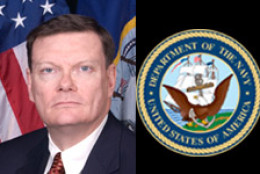Budget
-
Robert Work, the undersecretary of the Navy, says forget about the Reagan-era aspirations of a 600-ship fleet. Even with a smaller Navy, things are better than ever, he says, even if they're about to get worse due to smaller budgets and the threat of sequestration. "Yes, things might get worse. In fact, they probably will get worse. But this is the heyday of the U.S. Navy. And, if you're not excited, you ain't breathing," he said at the Surface Navy Association's annual symposium this week.
January 18, 2013 -
The Department of the Navy is finding real dollar savings by moving to enterprise software licenses, managing mobile devices and services better and reducing the number of printers and the amount printed. Terry Halvorsen, the DoN CIO, said they are on track to meet the goal of cutting 25 percent of their IT budget in five years. January 17, 2013
January 17, 2013 -
Janet Kopenhaver from Federally Employed Woman and Federal Times Senior Writer Sean Reilly, join host Mike Causey to talk about what would happen if the federal government were to shut down. January 16, 2013
January 16, 2013 -
The Air Force orders commanders to start cutbacks in advance of the next budget emergency.
January 16, 2013 -
Like Hollywood superheroes, federal workers managed to escape going over the fiscal cliff. But coming up in this regular mini-series is a possible shutdown because of the White House-Congress fight over the debt limit. If you survive that, there is the sequestration time bomb that is ticking and due to go off in March. Other than that, have a nice day.
January 16, 2013 -
The House soundly rejected an amendment to the Superstorm Sandy aid bill that would have required an across-the-board 1.63 percent cut to agency spending to offset the emergency funding. Rep. Mick Mulvaney (R-S.C.) introduced the amendment last week along with a separate proposal to revoke a mass-transit subsidy for federal workers.
January 15, 2013 -
Senior Correspondent Mike Causey wants to know: Is your job essential, emergency or mission-critical, and what does that mean? What would happen if you or your agency are told to turn out the lights and go home?
January 15, 2013 -
Agencies across government should intensify their planning for across-the-board sequestration cuts, according to a Jan. 14 memo to the heads of executive department and agencies from Jeff Zients, the acting director of the Office of Management and Budget. The memo comes on the heels of similar guidance issued last week by the Defense Department. Meanwhile, the Navy warned of the threat of reduced funding from a short-term spending measure.
January 14, 2013 -
Inside the Beltway is crisis central. The media must report 24/7 and, during the fiscal cliff showdown, they did. But while earlier stories also included a lot of eye-rolling, could the latest sequestration crisis mean it's "this time for sure?"
January 14, 2013 -
Defense Deputy Secretary Ashton Carter told DoD components Thursday to draw up plans for full-year continuing resolution, plus sequestration. The approach to deal with across-the-board cuts would be to freeze civilian hiring, cut training, travel and conferences and reduce business technology expenditures.
January 11, 2013 -
On this week's Bloomberg Government Capital Impact show, analysts examine NASA's acquisition forecast for this year, and the legislative agenda on Capitol Hill. January 10, 2013
January 10, 2013 -
New version of sequestration would reduce overall tab to DoD but compress across-the-board cuts into just seven months. A leading-think tank's "back of the envelope" calculations show the military would have to furlough almost every civilian.
January 10, 2013 -
Scott Quehl, the CFO, and Simon Szykman, the CIO, work closely together on ensuring projects remain on track and are efficient as possible. Their relationship is making it easier for Commerce to deal with budget and oversight pressures.
January 09, 2013 -
When lawmakers and the White House kicked sequestration two months down the road, they also made changes to how the cuts would be calculated. The Pentagon estimates the impact on the Defense budget would be gentler than before.
January 09, 2013 -
Michael Keating, senior editor for Government Product News, joins host Mark Amtower to talk about the GSA scandal, and other big stories in 2012. January 7, 2013
January 07, 2013





